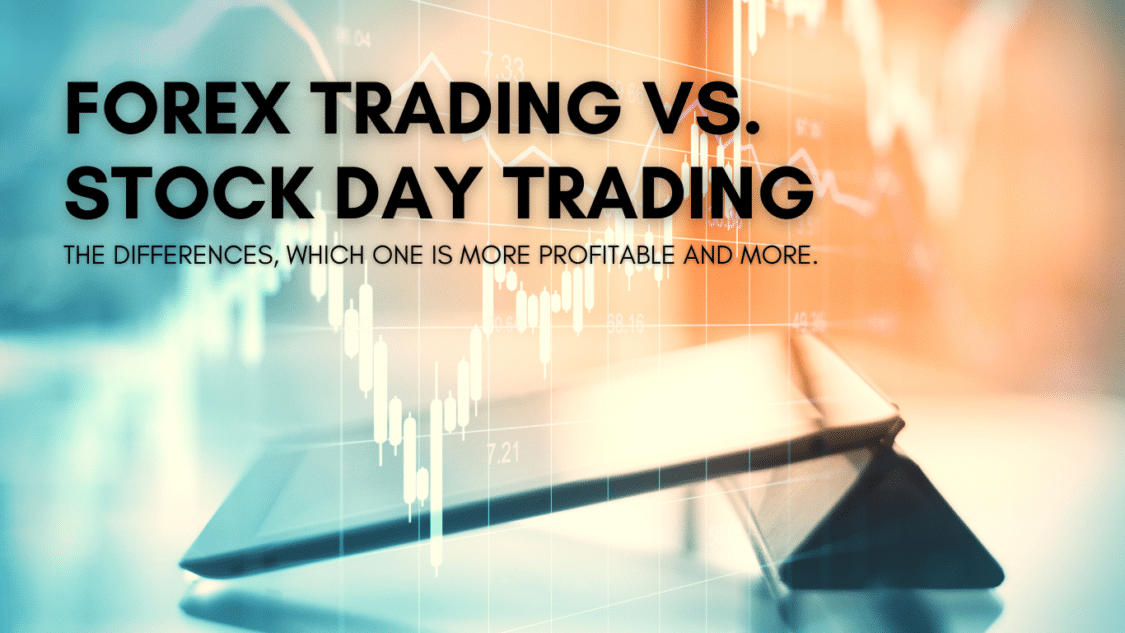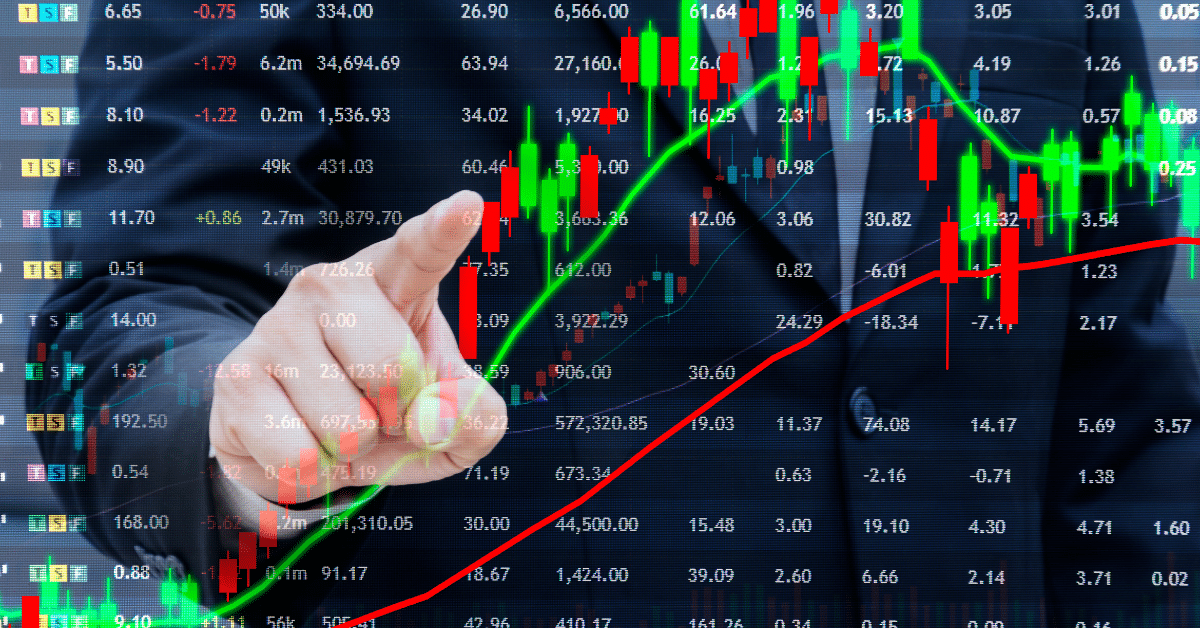Forex trading and stock day trading are two popular options for traders looking to profit. While both can be profitable, the choice ultimately depends on the trader’s skill level, risk tolerance, and trading strategy. To be successful in either, traders must possess knowledge, discipline, and resources to navigate the markets effectively. This requires having a well-defined trading plan, managing risk appropriately, and staying informed about market conditions. Ultimately, the key to profitability lies in the trader’s ability to execute a sound strategy, regardless of whether they trade forex or stocks.

What is Forex Trading?
Foreign exchange trading is used for buying and selling currencies in the foreign exchange market. This is the largest financial market in the world, with the daily average trading volume being over $5 trillion. One of the many advantages of it is its liquidity. Because the market is so large, buying and selling currencies anytime is easy. This makes it a popular choice for people worldwide, specifically those looking to make quick profits.
Another advantage of forex trading is that it is a highly leveraged market. Traders can control large positions with little capital. However, this also means a high level of risk, as a small move in the market can result in significant losses. A solid understanding of the market and the currencies being traded is necessary to trade forex successfully. It is also good to have a trading plan and stick to it. This includes setting clear goals, managing risk, and staying current on the latest market news and trends.
One important aspect to remember in the forex market is never to risk more money than you can lose. This is where risk management comes into play; knowing how much you can lose and setting a stop-loss order in your trade will help minimize any potential loss. Forex trading can be a highly profitable and exciting way to make money, but it is essential to be well-informed and well-prepared before getting started. By understanding the market and managing risk, traders can increase their success chances in the highly volatile currency market.
What is Stock Day Trading?
This refers to buying and selling stocks on the same day. Day traders are typically looking to make quick profits by taking advantage of short-term movements in the stock market. A basic understanding of the stock market and the individual stocks being traded is necessary to succeed in stock day trading. Furthermore, these traders should have a clear trading strategy that includes entry and exit areas and risk management measures.
One of the critical aspects of stock day trading is the ability to quickly analyze and respond to market conditions. Day traders should be able to identify opportunities for profit and make trades rapidly before the market has a chance to change. This requires a deep understanding of technical analysis and chart patterns and the ability to read and interpret market data and news.
Another important factor for stock day traders is the use of trading tools, such as charting software and trading platforms. These tools can help day traders quickly identify and execute trades, manage risk, and track performance.
Day traders must also have discipline, sticking to their trading plan and not letting emotions drive their trading decisions. In addition to knowledge and discipline, day traders should have the financial resources to support their trading activities. This can be a high-risk, high-reward endeavour, and traders should be prepared to lose some or all of their initial investment.
Overall, stock day trading may be a challenging and exciting method to make money, but it requires much time, effort, and cash input. By developing a solid understanding of the market, having a well-defined trading strategy, and utilizing trading tools, day traders can increase their chances of success in the stock market.

Forex Trading Vs. Stock Day Trading
Forex trading and stock day trading are both popular forms of investment. There are some critical differences that traders should be aware of before deciding which one they are interested in pursuing.
One of the main differences between forex trading and stock day trading is the market size. The foreign exchange market is significantly bigger than the stock market. This means that there is more liquidity and more opportunities for traders. However, the stock market is more transparent, providing more information and data on individual stocks.
Another difference is the level of risk. Forex trade is highly leveraged, meaning traders can control large positions with minimal capital. Due to the high level of risk involved, even a tiny market movement can cause significant losses. Stock day trading is also considered a high-risk endeavour, but the risks can be mitigated by having a well-defined trading strategy and managing risk effectively.
Regarding time commitment, forex is a 24/7 market, so traders can trade anytime, whereas stock day trading is only during market hours. Ultimately, the choice between forex trading and stock day trading will depend on an individual trader’s goals, risk tolerance, and experience level. Both markets offer profit potential, but they also come with their own set of risks and challenges. Traders should carefully consider these factors before making a decision.
Which is more profitable?
It is difficult to say which is more profitable, forex trading or stock day trading, as it depends on various factors such as the individual trader’s skills, risk tolerance, trading strategies, and market conditions. Both stocks and forex trading offer profit potential, but they also come with risks and challenges.

Who is Stock Day trading relevant for, and who is Forex Trading relevant for?
Stock day trading can be suitable for people who:
- Enjoy the research and analysis aspect of financial markets.
- People who are confident about managing uncertainty and taking risks in the market.
- Understand technical analysis and chart patterns regarding the market and assets they’re dealing with.
- Can handle the stress of making quick decisions under pressure.
- Have the financial resources at the tip of their fingers to invest in the stock market.
Forex trading can be suitable for people who:
- Have an interest in international financial markets.
- Are comfortable trading in a highly liquid and volatile market with unexpected highs and lows.
- Individuals who have a good understanding of technical and fundamental analysis.
- Can manage risks and handle high leverage.
- Have the financial resources to invest in the forex market.
Forex trading and stock day trading require different skills, knowledge, and financial resources. Understanding the risks involved and thoroughly researching before entering either market is essential.
Which is the more popular option?
Both stock day and forex trading are popular among traders, but the level of popularity may vary depending on the region, culture, and market conditions. In the United States, stock day trading is generally more popular among individual traders because of the availability of a wide range of stocks and the ease of access to the stock market. Many individuals have also succeeded in stock day trading and have built careers.
On the other hand, forex trading is more popular in different regions of the world, such as Europe, Asia, and the Middle East. This is because forex trading offers more flexibility regarding trading hours, and leveraged trading in the forex market is more available. Additionally, the forex market is much larger than the stock market, with an estimated $6.6 trillion daily trading volume, making it attractive to traders who prefer a highly liquid market.
In Australia, stock day trading is generally more prevalent among individual traders because of the strong performance of the Australian stock market and the ease of access to trading platforms. Additionally, there is a growing trend of retail investors in Australia who are turning to the stock market for investment opportunities.
Similarly, stock day trading is also popular in the UK among individual traders, with many traders active in the London Stock Exchange. The UK has a strong financial services industry, and the stock market is essential to the economy. Forex trading is also popular in Australia, and the UK, with many traders attracted to the 24-hour trading hours and the high liquidity of the forex market. The ability to trade forex with leverage is also a draw for some traders.
Conclusion
In conclusion, stock day trading and forex are two common investment strategies that have the potential for profits. However, they also bring with them a different set of risks. Due to its great liquidity and leverage, forex trading has tremendous potential for gains, but it also carries a high probability of loss. In contrast, stock day trade requires a clear understanding of both the stock market as a whole and specific equity, as well as a trading plan. A trader’s preferences, risk tolerance, and expertise determine the most profitable choice.
Achieving 2023 Market Profits: New Forex and Crypto Indicators

